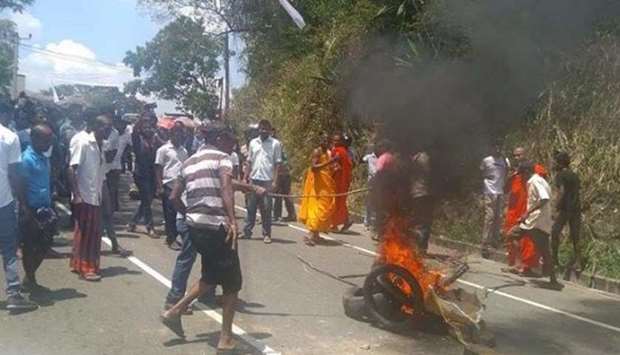
COLOMBO, March 7, 2018
Sri Lanka on Tuesday declared a nationwide state of emergency after riots targeting Muslims left at least two people dead and homes ablaze in a hill station popular with tourists.
The government said it was imposing the extraordinary measures after police failed to curb violence in Kandy, a central district famed for its tea plantations and Buddhist relics.
Heavily-armed police commandos were deployed to restore order in Kandy after rioters defied an overnight curfew and went on the rampage.
“The government is taking all possible measures to protect the people, especially Muslims,” Prime Minister Ranil Wickremesinghe told parliament.
He said an inquiry had also been opened into security lapses by police that allowed mobs of Sinhalese rioters to burn mosques as well as homes and businesses belonging to Muslims.
The body of a 24-year-old Muslim man was pulled out of a burnt home on Tuesday. Police said two dozen people had been arrested in the wake of the riots.
The emergency measures, imposed for the first time since 2011, give authorities sweeping powers to arrest and detain suspects for long periods, and deploy forces where needed.
President Maithripala Sirisena said the measures would “redress the unsatisfactory security situation prevailing in certain parts of the country”.
“The police and armed forces have been suitably empowered to deal with criminal elements in the society and urgently restore normalcy,” he said.
City planning minister Rauff Hakeem described the riots as a “monumental security lapse” and recommended disciplinary action against those responsible for allowing the situation to deteriorate.
Sri Lanka’s parliament Tuesday issued an apology to its Muslim minority, which constitutes 10 percent of the country’s population of 21 million.
The violence in Kandy, a serene region of verdant hills frequented by tourists and pilgrims, has threatened to reignite communal tensions that have roiled Sri Lanka in recent weeks.
– War-era measures –
The emergency declaration was made after a special cabinet meeting with President Sirisena.
It is the first time in seven years Sri Lanka has resorted to such a measure. The island nation was under a state of emergency for nearly three decades as government forces battled Tamil rebels in a civil war that ended in 2009.
Riots erupted on Monday after a man from the island’s mainly Buddhist Sinhalese majority died at the hands of a Muslim mob last week.
Hakeem said the riots were concentrated in Kandy, but the government wanted to send a strong message following recent outbreaks of communal violence elsewhere in the country.
Mobs set fire to Muslim-owned businesses and attacked a mosque in the east of the country last week after a Muslim chef was accused of adding contraceptives to food sold to Sinhalese customers.
The government dismissed the allegation as baseless and ordered the arrest of those fomenting unrest in the area.
Last November riots in the south of the island left one man dead and homes and vehicles damaged.
In June 2014 riots between Buddhists and Muslims left four dead and many injured.
That bout of violence was instigated by a Buddhist extremist group whose leaders are on trial, accused of spurring religious conflict.
—
13- Two Koreas to hold summit, Pyongyang offers nuke deal: Seoul
SEOUL, March 6, 2018 (AFP) – North and South Korea have agreed to hold a summit at their heavily armed border next month, with Pyongyang saying it would consider abandoning nuclear weapons in exchange for security guarantees, Seoul said Tuesday.
If confirmed by Pyongyang, the offer would mark the first time under the current leadership the North had declared itself willing to discuss conditions under which it might consider giving up its nuclear arsenal — a move it has previously insisted was firmly off the negotiating table.
Following a meeting in Pyongyang with leader Kim Jong Un, Chung Eui-yong, the national security adviser to South Korean President Moon Jae-in, said the North had stated there was “no reason” to hold on to its nuclear weapons “if military threats towards the North are cleared and the security of its regime is guaranteed”.
Chung said Kim and Moon would meet in late April at the fortified border village of Panmunjom for what would be only the third inter-Korean summit since the end of the 1950-53 Korean conflict.
He said the two sides would establish a leader-to-leader hotline, offering the highest-level contact between two nations that are technically still at war.
After months of soaring tensions that have seen Kim Jong Un trade insults and threats with US President Donald Trump, temperatures cooled dramatically as South Korea hosted the Winter Olympics.
Despite having few athletes competing at the Games, Pyongyang sent a large and colourful delegation, which included Kim’s sister, who met with Moon to offer a summit meeting.
That visit was returned this week when Moon sent the highest-level delegation in a decade north of the border.
The envoys returned Tuesday with news of apparent breakthroughs in the long-logjammed relationship.
“The South and the North agreed to hold the third summit at… Panmunjom in late April,” said Chung, referring to the truce village at the heavily-fortified border.
If realised, the summit will be the third meeting between the leaders of the two Koreas, which technically remain at war after the 1950-53 Korean War ended with an armistice instead of a peace treaty.
The previous two summits were held in 2000 and 2007, respectively, under South Korean presidents Kim Dae-jung and Roh Moo-hyun who both advocated dialogue with Pyongyang.
They both met with Kim’s father, Kim Jong Il.
The two Koreas also agreed to open communication hotline between Moon and Kim to “defuse military tension and to have close coordination,” Chung said Tuesday.
The leaders will have their first phone conversation before the planned summit, he added.
North Korea also pledged that it would freeze its nuclear and missile testing programme during the period of dialogue.










